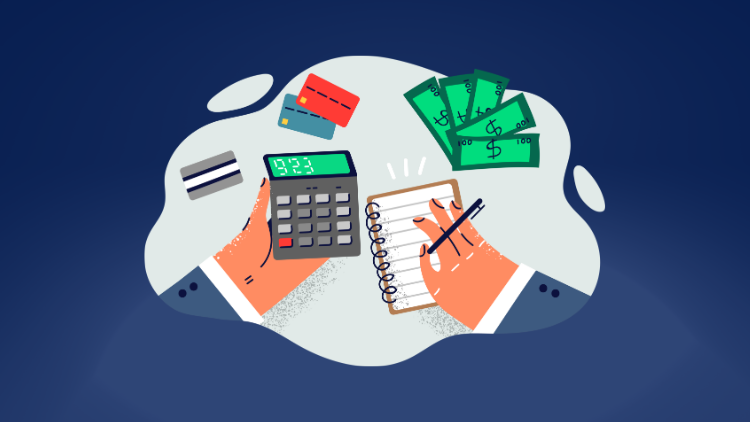Your credit score might seem like just another adult thing to worry about, but it actually plays a huge role in your financial freedom. Let's get into it.


When you’re in college, building credit probably isn’t at the top of your to-do list. You’re busy with classes, friends, part-time jobs, and trying to figure out your future — totally fair. But here’s something most students don’t realize: the habits you build now can shape your financial opportunities for years after graduation.
.png)
Your credit score might seem like just another adult thing to worry about, but it actually plays a huge role in your financial freedom. Landlords, lenders, and even some employers look at credit history to see how responsible you are with money. The earlier you start building it — and managing it wisely — the better.
The good news? You don’t need a full-time job or a fancy financial background to build good credit. A few small, intentional actions in college can lead to major payoffs later on.
Your credit score is like a snapshot of your financial reliability. It’s a three-digit number — typically between 300 and 850 — that shows how well you handle borrowed money.
When you apply for your first apartment, car loan, or even a cell phone plan, companies use that score to decide whether to trust you. Think of it as your financial reputation.
💡 Quick Tip: You can check your credit report for free at AnnualCreditReport.com. It’s smart to check once a year to make sure everything looks accurate.
Student credit cards are designed specifically for beginners. They usually have lower credit limits and don’t require a long credit history — making them perfect for college students.
✅ Use your card for small, manageable expenses (like groceries or gas).
✅ Pay off the entire balance every month — not just the minimum.
✅ Keep your usage below 30% of your limit (if your limit is $500, try to use under $150).
Even one missed payment can lower your score, so consistency is key. Treat your credit card like a debit card — not a source of “extra money.”
🧠 Pro Tip: Avoid applying for multiple cards at once. Start with one, prove you can manage it, and build from there.
If you’re nervous about having your own card or don’t qualify yet, ask a parent or close family member to add you as an authorized user on their credit card. You’ll get a card in your name, but the account’s history (and their on-time payments) will also show up on your credit report. It’s a simple, low-risk way to start building credit early.
Just make sure the main cardholder manages their card responsibly — their mistakes could affect your score too.
This one’s huge. Payment history is the single most important factor in your credit score. One late payment — even by a few days — can stay on your credit report for up to seven years.
So whether it’s your credit card, rent, utilities, or phone bill, always pay before the due date.
💡 Hack: If you don’t have many bills in your name yet, use tools like Experian Boost to add consistent payments (like Netflix or your cell phone) to your credit file. It’s an easy way to get credit for the bills you’re already paying.
Credit can open doors, but it can also dig holes if used carelessly. Avoid treating your credit card as “extra cash.” Borrow only what you can afford to pay back each month. Stick to one or two accounts and keep your spending predictable. Applying for too many cards at once can signal risk to lenders and temporarily lower your score. If you have student loans, consider paying off the interest while in school if you can. Even small payments build good financial habits and reduce your total balance after graduation.
You don’t have to obsess over your score, but keeping an eye on it helps you stay informed — and catch errors early.
Many banks and credit card apps now include free credit score tracking. Look for trends:
If something seems off, dispute it through the credit bureau right away. Staying proactive is part of being financially smart.
Building good credit isn’t instant. It’s a slow, steady process that rewards consistency. Even if your score starts low, every on-time payment, every responsible swipe, and every month of credit history helps. By the time you graduate, those small actions can add up to a strong credit foundation — which means easier apartment approvals, lower loan interest rates, and more financial flexibility as you start adult life.
So don’t stress about doing everything perfectly. Focus on progress, not perfection.
Building credit while you’re still in college might not seem urgent, but it’s one of the smartest financial moves you can make.
Start small. Stay consistent. And remember that every responsible choice today sets you up for bigger opportunities tomorrow. You don’t need to be wealthy or work full-time to build good credit — you just need a plan and the right resources to help you along the way.
If you want more guidance on how to make smart money moves in college, you’ll love the Fund Your Future Student Portal by College Funding Hero.
✅ Weekly scholarship updates to help you pay for school
✅ Courses and ebooks that break down financial aid and credit in plain English
✅ Access to 1:1 office hours with a college funding pro
✅ Step-by-step guides on building credit, budgeting, and preparing for post-grad life
👉 Join Fund Your Future today and start setting yourself up for financial success long before graduation.
